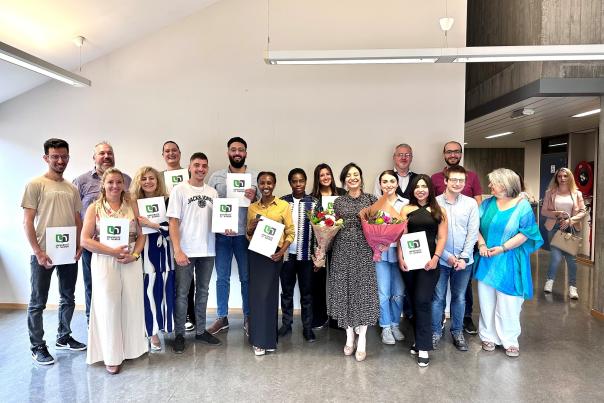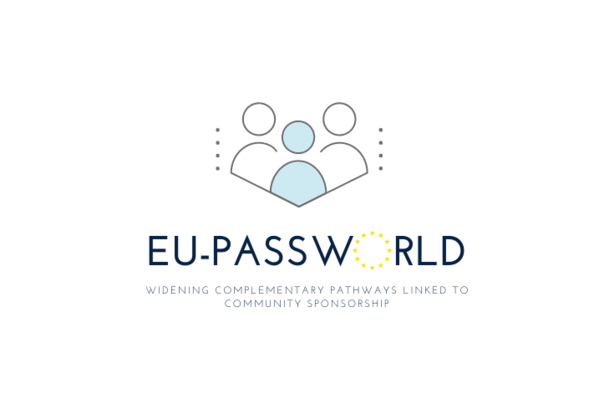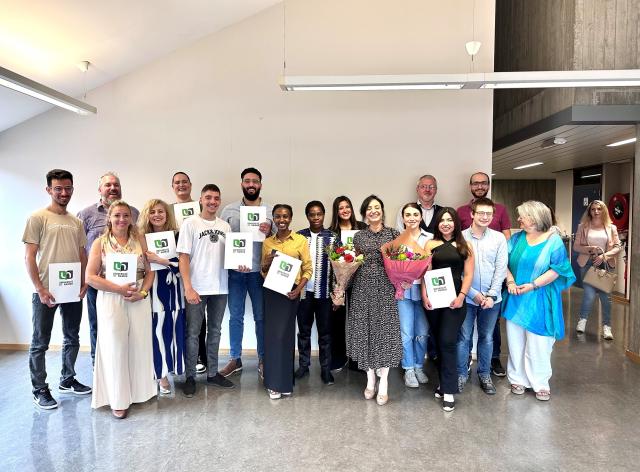Actions in favor of the reception, protection and training of (candidate) refugees illustrate the University of Namur's commitment to defend and promote its fundamental values of openness, freedom, sustainability and excellence that place people at the heart of priorities.
This approach follows the principles of a hospitable university, more welcoming, inclusive and attentive to specific needs to transform the institution into a place of caring and support for all.
Discover current projects and actions here.
The Local Integration Initiative (LII) project
Since 2015, the University of Namur and the pedagogical department of the Haute école de Namur-Liège-Luxembourg have been collaborating in the implementation of intercultural exchanges that are part of the ILI Project funded by the Walloon Region in order to provide French as a Foreign Language (FLE) courses and intercultural workshops within the institution.

Objectives
- To train migrant learners in French as a Foreign Language (FLE) and French for University Purposes (FOU) in order to help them enter university, higher education in Haute École, Social Promotion or continuing education.
- Foster intercultural dialogue and living together in the host society in general and on the university campus in particular via the organization of intercultural activities focusing on the needs of the beneficiary public.
- To train migrant learners in the cultural specificities of higher education in Belgium.
Target audiences
- FLE axis: Beneficiaries of French language training: People of foreign origin, asylum seekers and refugees.
- Interculturality axis: The beneficiaries of the intercultural project are:
- Students in higher education (UNamur, Hénallux...)
- FLE learners in the ILI project
- The native population and people of foreign origin
- Professionals in the sector
- The public of our partners
EU-Passworld | University corridor to Belgium for students in need of international protection
EU-Passworld is a three-year project funded by the European Fund for Asylum, Migration and Integration, linking community sponsorship with work and education pathways.
This university corridor was tested during the 2023-2024 academic year at KULeuven. The University of Namur joins the consortium in 2024-2025.

This multi-stakeholder consortium will work in Belgium, Ireland and Italy to design, pilot and implement innovative complementary pathway programs, creating a minimum of 200 new places for the legal admission of refugees and leveraging community sponsorship to provide them with holistic integration support.
Support for Ukrainian and Lebanese students
The University of Namur is mobilizing to support those who have had to flee their country and wish to continue their academic activities.
In 2022, a platform of support for Ukraine is created.
In the current context, the University of Namur in collaboration with the Université Saint-Joseph (USJ) in Beirut is building a host program for students and researchers. The Université de Namur would contribute to the travel expenses of these people. In addition, a reduction in registration fees will be offered.
The International Publics project
The project is placed under the sponsorship of the Vice-Rector for Social and Student Affairs. It involves collaboration between the Rector's Council, the Academic Council and the Board of Management, as well as a range of community members, students and staff.
The project aims to improve the reception, integration and follow-up of international students, staff and researchers, with a methodology that focuses on needs analysis and the implementation of adapted, cross-functional solutions.
As a first step, a diagnosis of the situation was made, with possible solutions identified, generating various sub-projects dedicated to the implementation of solutions. These solutions, divided into 8 axes (automation of workflows, formalization of procedures, sponsorship, cultural integration, etc.), aim to optimize the experience of international audiences from their arrival to their departure.
The avenues include practical actions such as, among others, the creation of information packs, the introduction of training and integration sessions, a sponsorship system, and automated tracking to facilitate administrative procedures.
The ultimate aim is to decompartmentalize processes for harmonized care, with practices potentially applicable to national audiences, thus reinforcing the institution's overall efficiency.
